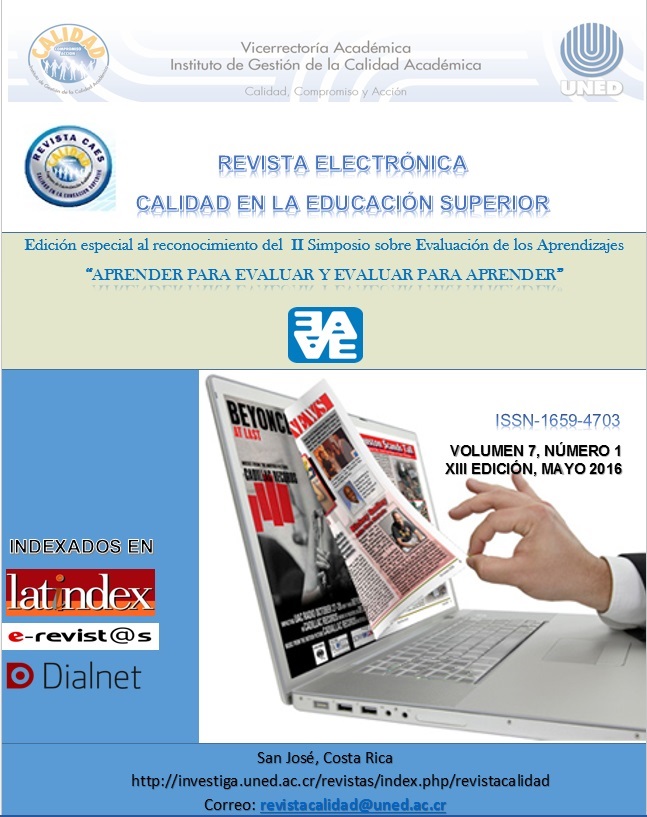PRINCIPIOS DE LA RETROALIMENTACIÓN DESDE EL DIÁLOGO DIDÁCTICO MEDIADO
DOI:
https://doi.org/10.22458/caes.v7i1.1377Abstract
La educación a distancia comprende un proceso esencialmente comunicativo, que se caracteriza por tener una finalidad educativa a través de diferentes medios y materiales didácticos; dentro del cual la retroalimentación como parte de la evaluación formativa de los aprendizajes, es un elemento fundamental para favorecer en el estudiantado la autorregulación y autonomía. Así, el presente artículo corresponde a una revisión bibliográfica cuyo objetivo fue establecer los principios de la retroalimentación desde el diálogo didáctico mediado como estrategia para el favorecimiento de aprendizajes significativos y el desarrollo de la capacidad de aprender a aprender en el estudiantado de la educación superior a distancia; en el que se determina como principios básicos la retroalimentación a tiempo, con interacción multidireccional y que dé respuesta a tres preguntas claves: ¿A dónde voy? ¿Cómo voy? ¿Qué sigue?
Palabras clave: retroalimentación; proalimentación; educación superior a distancia; diálogo didáctico mediado; autorregulación del aprendizaje
Abstract
The distance education includes an essentially communicative process, which is characterized by having an educational aim through different media and materials; within which the feedback as part of the formative evaluation of learning, is a fundamental element in favor of self-regulation and autonomy in the student body. Thus, this article corresponds to a bibliographical review whose purpose was to establish the principles of feedback from didactic dialogue mediated as a strategy for the promotion of meaningful learning and the development of the ability to learn to learn in higher distance education students; on that is determined, as basic principles, the feedback in time, with multidirectional interaction and that give answers to three key questions: Where am I going? How do I go? What's next?
Keywords: feedback; feed forward; higher education at a distance;mediated didactic dialogue; self-regulation of learning
References
Alvarado, M. (2014) Retroalimentación en Educación en línea: una estrategia para la construcción del conocimiento. Revista iberoamericana de educación a distancia, RIED 17(2), 59-73.
Anderson, T. (2008) (Edit.).The theory and practice of online learning. Edmonton: Athabasca University Governing Council.
Anderson, T. y Dron, J. (marzo, 2011) Three generations of distance education pedagogy. IRROLD International review of research in open and distributed learning, 12(3), 80-97. Recuperado de http://www.irrodl.org/index.php/irrodl/article/view/890/1826
Brown, S. y Glasner, A. (Edits.) (2010) Evaluar en la Universidad. Problemas y nuevos enfoques. Madrid, España: Narcea.
Coll, C., Rochera, M. J., De Gispert, I., y Diaz, F. (2013). Distribution of Feedback among Teacher and Students in Online Collaborative Learning in Small Groups. Digital Education Review, 23, 27-46.
Evans, C. (marzo, 2013). Making sense of assessment feedback in higher education. Review of educational research, 83(1), 70-120. Doi: 10.3102/0034654312474350.
Ferguson, P. (2011). Student perceptions of quality feedback in teacher education. Assessment & evaluation in Higher Education, 36(1), 51-62. Doi: 10.1080/02602930903197883
García, L. (2014) Bases, mediaciones y futuro de la educación a distancia en la sociedad digital. Madrid, España: Editorial Síntesis.
Gilbert, L., Whitelock, D. y Gale, V. (Julio, 2011) Synthesis report on assessment and feedback with technology enhancement. Learning societies lab in the School of Electronics and Computing Sciences, University of Southampton y Institute of Educational Technology, The Open University. Recuperado de http://eprints.soton.ac.uk/273221/1/Synthesis%20report%20on%20assessment%20and%20feedback%20Final%20Report%20July%202011.pdf
González, P. (1988) La conversación didáctica guiada en la elaboración de material instruccional para la educación a distancia. Informe de investigaciones educativas, II (2), 201-218. Recuperado de http://biblo.una.edu.ve/ojs/index.php/IIE/article/view/188/178
Gutiérrez, F y Prieto, D. (1999). La mediación pedagógica. Apuntes para una educación a distancia alternativa. Argentina: Ediciones La Crujía.
Hattie, J. y Timperley, H. (marzo, 2007). The power of feedback. Review of Educational Research, 77(1), 81-112. DOI: 10.3102/003465430298487
Holmberg, B., Shelley, M., y White, C. (2005). Distance Education and Languages: Evolution and Change. Clevedon: Multilingual Matters.
Lozano, F.G. y Tamez, L. A. (2014). Retroalimentación formativa para estudiantes de la educación a distancia. RIED. Revista Iberoamericana de Educación a Distancia, 17(2), 197-221. Recuperado de http://www.redalyc.org/articulo.oa?id=331431248010
Medel-Añonuevo, C., Ohsako, T. y Mauch, W. (2001) Revisiting lifelong learning for the 21st century. Filipinas: UNESCO Institute for Education. Recuperado de http://www.unesco.org/education/uie/pdf/revisitingLLL.pdf
Moreno, M. (Coord.) (2012) Veinte visiones de la educación a distancia. Guadalajara, México: UDGVIRTUAL. Recuperado de file:///G:/Users/nsalas/Documents/Proyecto%20Evaluaci%C3%B3n%20Aprendizajes/20_visiones_educaci%C3%B3n_distancia.pdf
Rodríguez, G. & Ibarra, S. (Edits.) (2011) e-Evaluación orientada al e-aprendizaje estratégico en educación superior. Madrid, España: Narcea.
Rodríguez, P. (enero-febrero, 2007) Un modelo de comunicación en la educación a distancia. Una reflexión educomunicativa. Innovación educativa, 7(36), 36-51. Recuperado de http://www.redalyc.org/pdf/1794/179420814004.pdf
Sanmartí, N. (2007) Diez ideas clave. Evaluar para aprender. Barcelona, España: Editorial Grao.
Simonson, M. R., Hudgins, T. L., & Orellana, A. (2009). The Perfect Online Course: Best Practices for Designing and Teaching. Charlotte, N.C.: Information Age Publishing.
Simonson, M., Smaldino, S., Albright, M. & Zvacek, S. (2009) Teaching and learning at a Distance. Foundations of distance education. (4a. Ed.) USA: Pearson Education.
Wiggins, G. (setiembre, 2012). Seven Keys to Effective Feedback. Educational Leadership, 70(1), 10-16. Recuperado de http://web.b.ebscohost.com.talamanca.uned.ac.cr/ehost/pdfviewer/pdfviewer?vid=6&sid=993e483b-a369-440c-9329-07bd720d838b%40sessionmgr112&hid=123
Downloads
Published
How to Cite
Issue
Section
License
Esta revista provee acceso libre inmediato a su contenido bajo el principio de que hacer disponible gratuitamente la investigación al publico, lo cual fomenta un mayor intercambio de conocimiento global.
